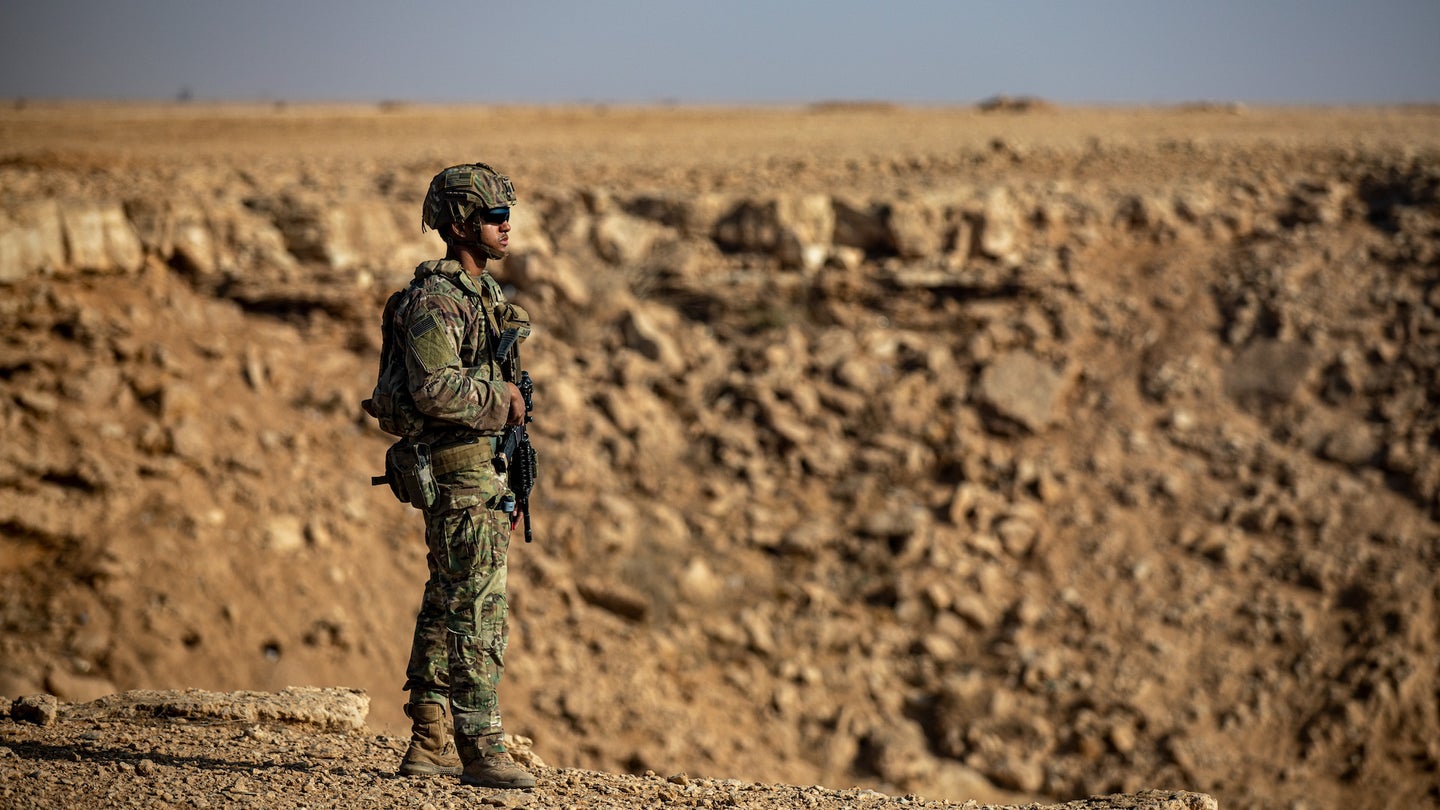20 years after invading Iraq, US troops are still holding things together there
"We must continue the fight against ISIS alongside our partners.”

It’s been nearly 20 years since a U.S.-led military coalition invaded Iraq and toppled Saddam Hussein, and U.S. troops are still fighting alongside the Iraqi government to stabilize the country’s security situation.
In February, Iraqi Security Forces (ISF) conducted 33 partnered operations with coalition military personnel targeting Islamic State group militants, according to the latest data from U.S. Central Command, the exact same number it conducted in January of this year.
While the U.S. hasn’t conducted any unilateral operations in Iraq since the start of the year (CENTCOM did not disclose data on those carried out there in 2022), if partnered operations continue at this rate they will outstrip last year’s total of 191 operations just over halfway through this year, suggesting that the U.S. counterterrorism operations in Iraq, like in Syria and Somalia, are slowly heating up once again.
“We are focused on ensuring the enduring defeat of ISIS,” CENTCOM commander Gen. Michael “Erik” Kurilla said in a statement accompanying the February operations data. “We continue to work with our partners to take the fight to ISIS in both [Iraq and Syria].”
Subscribe to Task & Purpose Today. Get the latest military news, entertainment, and gear in your inbox daily.
The United States invaded Iraq in 2003, disbanding the Iraqi military and failing to adequately retrain a replacement over the next several years. Although the U.S. military formally ended combat operations in Iraq in 2011, American forces returned in 2014 under the auspices of the U.S.-led Combined Joint Task Force-Operation Inherent Resolve to lead the fight against ISIS. President Joe Biden subsequently announced the end of U.S. combat missions in Iraq under CJTF-OIR in July 2021, stating that “our role in Iraq will be … to be available to continue to train, to assist, to help, and to deal with ISIS – as it arrives.”
Despite this, there are still around 2,500 U.S. troops in Iraq as part of the United State’s ongoing advise and assist mission there at the invitation of the Iraqi government.
But the sustained presence of U.S. troops in Iraq isn’t to say that the ISF is faring as poorly as other U.S.-backed security forces in the region. According to the U.S. Defense Department’s lead inspector general report for CJTF-OIR published this past February, the ISF has in recent years increasingly proven capable of carrying out counter-ISIS operations “often without Coalition support.” Indeed, the Iraqi Counterterrorism Service (CTS) alone carried out 388 counter-ISIS operations in the last three months of last year (part of a larger uptick in CTS operations starting in the July) with only 30 involving coalition partner forces.

“CJTF-OIR reported that the Coalition provided advice during the planning and execution phases, including advice on guidelines for the operations commands,” according to the IG report. “CJTF-OIR advisors observed the ISF’s ability to conduct an operation that involved multiple assets, such as intelligence, surveillance, and reconnaissance (ISR), fire support, ground forces, and civil affairs.”
Of course, partner forces in Iraq still aren’t totally independent of U.S. troops, “continu[ing] to rely on the Coalition, particularly for [ISR] support” in general, according to the IG report, so far that independent ISF airstrikes against ISIS targets declined in the last three months of last year due to, among other things, “a decrease in available Coalition ISR assets” compared to the previous quarter.
“According to CJTF-OIR, Coalition advisors enabled nearly all of the Iraqi strikes (except [a] December 6 independent strike) through ISR observation, directing pilots to targets, and terminal guidance,” according to the IG report.
Despite the progress made by the ISF under the guidance of coalition forces there, U.S. commanders don’t appear to expect U.S. troop levels on the ground there to change anytime soon.
“As we look into the future, any force level adjustment in Iraq is going to be made as a result of consultations with the government of Iraq,” then-CENTCOM chief Marine Gen. Frank McKenzie told Military Times last March. “And we just finished a strategic dialogue a few months ago ― we believe that will continue.”
“You want to get to the state where nations, and security elements in those nations, can deal with a violent extremist threat without direct support from us,” he added. “Right now we have the Iraqis doing the fighting. We’re still helping them. Over time you’d like for them to take a larger share of all the enabling that we’re doing now.”
Current CENTCOM chief Kurilla echoed McKenzie’s comments during a recent trip to Baghdad to discuss CJTF-OIR, emphasizing that, so long as ISIS can maintain an ideological foothold among the population there amid ongoing political and economic stability, the U.S. will continue to support the Iraqi security forces for the foreseeable future.
“In Iraq, we continue to advise, assist, and enable the [ISF] in the fight against ISIS,” Kurilla said in February. “Territorially, ISIS is defeated and incapable of holding large swaths of land. However, ISIS remains a threat and its vile ideology remains uncontained and unconstrained.”
“ISIS continues to represent a threat to not only Iraq and Syria, but to the stability and security of the region,” he added. “Therefore, we must continue the fight against ISIS alongside our partners.”
The latest on Task & Purpose
- Keanu Reeves is back as John Wick, possible Marine vet
- US Army M1 Abrams tank named ‘ASVAB Waiver’ keeping watch in Poland
- How the Air Force flew its longest-distance night hostage rescue
- A U-2 spy plane pilot took a selfie with the Chinese spy balloon
- How Green Beret Paris Davis’ teammates fought for his Medal of Honor
